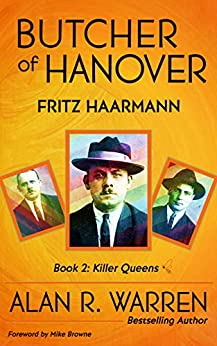Alan R. Warren talks mystery radio and true crime

by Timothy Pike
Considering where he started, it’s impressive how far Seattle-based radio host and bestselling author Alan R. Warren has come.
“People always told me I would never be on radio because I wasn’t a good communicator,” Alan says, “and that I would never be able to write professionally.” But his rise to become producer and lead host of a popular radio show, as well as a prolific author of crime tales and memoirs, speaks volumes about his determination in the face of challenge.
 Being autistic, colorblind, and left-handed—and also having been born in the 1960s—didn’t make his path any easier. “Because I was so quiet and in my own world in a time that autism wasn’t understood,” he says, “was probably the biggest hurdle to overcome. And I’m still battling it. It’s something that took me longer to do, and something I have to work at every day.”
Being autistic, colorblind, and left-handed—and also having been born in the 1960s—didn’t make his path any easier. “Because I was so quiet and in my own world in a time that autism wasn’t understood,” he says, “was probably the biggest hurdle to overcome. And I’m still battling it. It’s something that took me longer to do, and something I have to work at every day.”
But let’s rewind for a minute. It was in Alan’s early childhood that he developed an interest in radio—and more specifically, in what he heard coming over the airwaves. “When I was a young kid, I was always fascinated with radio,” he says, “and as long as I can remember, I would listen to talk radio or radio shows.” CBS Mystery Theater, Richard Diamond, Private Detective, and The Man Called X ranked among his favorites.
Seeing radio as a natural fit, Alan stepped into that world, and the experience he gained led him to where he is now, calling the shots as producer and lead host of the NBC radio show House of Mystery. “When I started on radio, my co-hosts were chosen for me, and that was okay,” he says. “Now, I have chosen my co-hosts because of who they were as people, not how much radio experience they had.”
Alan’s writing career, meanwhile, came about by accident. “I was asked to write a few small articles for newspapers and magazines,” he recounts. “After that, a publisher out of Toronto approached me to write four short reads for their True Crime Canada book series. The first book of the four that I wrote for him, Above Suspicion, became a large hit very quickly by selling 44,000 copies, which led to me writing a full book on the serial killer Russell Williams, which was called Beyond Suspicion.”
“I like to go away to a city that I don’t know very well,” Alan says. “There’s a certain feeling that comes from being around a million people you don’t know, kind of a lonely survival feeling.”
The process that Alan has developed for writing these thrilling books—all of which are based on true stories—begins with a scouting mission. “I usually get asked about a certain case or story, and search out the idea and see if it’s something I would want to write about,” he explains. “Usually in non-fiction, I want to talk with people who were involved in the story and see if they would want to be a part of the book. Murder Times Six was a book like that. It was the true story about a murder that happened at the Wells Gray Park in British Columbia, Canada, where a family of six were murdered in the park.”
Then, Alan seeks out anybody with first-hand knowledge of the crimes. “It’s really important to have as many people as possible who lived through the story to be involved in the writing of the book, or it usually won’t be a complete telling of the story,” he says. “In this particular story, the killer was coming up for parole, and the victim’s remaining members of the family wanted a book to have and use during the parole hearings.”
But there’s one more step before Alan can feel totally ready to take the plunge into any given story. “Once I get all the research and reports needed to write the book,” he says, “I usually like to go away to a city that I don’t know very well, or even have never been to before. There’s a certain feeling that comes from being around a million people that you don’t know, kind of a lonely survival feeling.”
This gives Alan the mental fuel he needs to start putting words down on paper. “My emotions and what’s going on around me or in my life very much affect how I write,” he says. “I can do research and investigate stories almost any time, but writing is different. It’s more about if the emotions I am feeling fit the part of the story I am writing.”
Killer Queens, Alan’s latest series, portrays murder cases where either the victims or the murderers, or both, belonged to the gay community. So far, he’s completed two books, with a third on the way.
The stories bring to light major differences in how cases were handled in America and Germany at the time.
“Being part of the gay community myself,” he says, “over the years I had always noticed that gay community murderers and victims were treated differently. I wanted to answer the question of how both murder cases were handled in the public and by law enforcement.”
Due to what he calls “creative additions”—mostly in the form of imagined conversation between some of the people involved—Alan considers the books historical fiction, even though they depict real murders and chronicle actual events.
The stories bring to light major differences in how cases were handled in America and Germany at the time. “An example is the first two books in the series, Leopold & Loeb and Butcher of Hanover,” Alan explains. “Both murder cases occurred in the 1920s. These two cases were connected in places that were not noticed back in the time they happened. Leopold & Loeb happened in Chicago, while The Butcher of Hanover was in Germany.”
And the differences were stark. “In Germany, gay life was much better than it was in America,” Alan says. “While it was considered a crime and a sickness that needed to be cured in America, in Germany it wasn’t. In fact, the king of Prussia, who was the major leader at the time in the German empire, had an inside circle of advisors who were mostly gay, which made him more open to gay people.”
As the cases Alan covers get more recent, technology and dating apps make an appearance. “This series will continue up to modern times,” he says, “such as in the U.K. with Stephen Port—’The Grindr Killer’—where police ignored five murders because the victims were considered gay and used drugs.”
That book is now in the editing stages, and is slated to be released later this summer. “In this book I also have several letters from Port who is in prison,” Alan says, “which is a real eye opener when it comes to seeing what goes on in the mind of a killer.”
Alan’s even got another separate project in the works. “I have been working on a detective mystery series as well,” he says, “in the style of something like a 1960s noir, in which the first book should be out for Christmas 2022.”
Alan R. Warren is a bestselling author and producer and lead host of the popular NBC radio show House of Mystery. Al started out writing articles for True Case Files Magazine and is still a contributor. He has completed twenty-four non-fiction books covering true crime, cults, human trafficking, history, and memoirs for three different publishers. His latest series of books, Killer Queens, is a six-part book series covering murders that affect the gay community. Learn more about Al on his website.
You can also connect with Alan on his House of Mystery page, Facebook personal page, Facebook author page, Instagram, and Twitter.